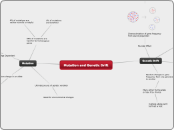Mutation and Genetic Drift
Genetic Drift
Random changes in gene
frequency from one generation
to another
Many either fix the allele
or lose it by chance
multiple alleles can't
be fixed or lost
Founder Effect

Chance deviation of gene frequency
from source population
Larger samples size
the smaller the deviation
from the average
Bottleneck effect

Dramatic reduction in population
size leading to reduced genetic
variability
Migration
Movement of individuals
between established
existing populations
Population genes become more alike
time goes on and migration is constantly
going back and forth between the two
Mutation
Random change in an allele
1:1000-1:100000
of offsprings will have
a change in allele not
from the parent due
to mutation
Age Dependent
Higher rate of
mutations in
older parents
95% of mutations are
harmful for homozygous
genes
4% of mutations are
neither harmful or helpful
1% of mutations
are beneficial
Ultimate source of genetic variation
Good for environmental changes
